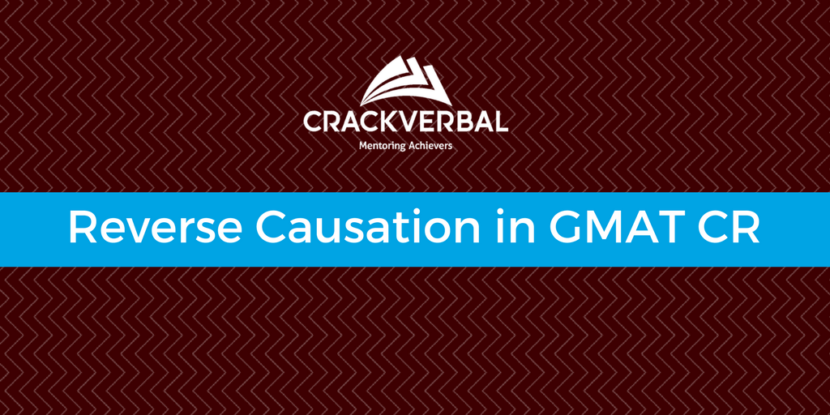Assumption-based questions make up about 40% of the questions in GMAT CR. They test you on your ability to identify and understand the relationships – if any – that exist between the premises and the conclusion. Some of the tricky logical traps that assumption-based questions may contain are based on causality.
Today, we will look at Reverse Causation in GMAT CR.
Causation means that one event triggers or causes another. The direction of this causation (does X cause Y or vice versa?) is the trap that GMAT sets. Let me take an example:
Every day, at 9AM, Ramu the peon rings the school bell and Mrs.Mathews, the Principal, comes out of her room for the school assembly.
There are 2 events here
Event X: Ramu rings the bell
Event Y: Mrs. Mathews comes out of her room
From this, can we assume that Mrs.Mathews comes out for the assembly because she heard Ramu ring the bell? i.e. can we assume that X is causing Y? It does seem reasonable, doesn’t it?
Now, think about this in a different way: Every day, at 9AM, the punctual Mrs.Mathews comes out for the assembly, and upon seeing her, Ramu the peon rings the bell. Also plausible? 🙂
This means that Y could be causing X.
Thus, a causal relationship exists between X and Y, but its direction needs to be evaluated.
Now let me take a GMAT CR question:
A researcher discovered that people who have low levels of immune-system activity tend to score much lower on tests of mental health than do people with normal or high immune-system activity. The researcher concluded from this experiment that the immune system protects against mental illness as well as against physical diseases.
The researcher’s conclusion depends on which of the following assumptions?
The argument‘s conclusion is that ISA impacts mental health. We need to identify the underlying assumption. The correct answer to this question is option D: Mental illness does not cause people’s immune-system activity to decrease. This is a classic case of reverse causation.
Let us negate option D: Mental illness causes people’s immune system activity to decrease. If this were to be true, it means that mental illness impacts ISA and not vice versa. i.e. Y is causing X and not the other way round. This breaks the argument – since negation breaks the argument, option D is the right answer.
Key Takeaway
Whenever you see a cause-effect relationship between 2 events on a GMAT CR question, question its direction. Do not take for granted the direction apparently given in the question stem.

Hope these techniques make a positive difference to your GMAT prep! If you’d like to share what works for you and what doesn’t, please leave a comment in the comment section below.
Head over to our Video library for more useful information on how to achieve an awesome GMAT score!
[button href=”http://gmat.crackverbal.com/free-resources/video-library/” style=”emboss” size=”medium” textcolor=”#ffffff”]Explore Video library![/button]

